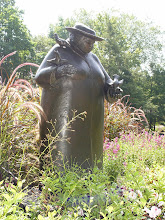at least, according to John Milton in Paradise Lost, in which the fallen angels eat apple of Sodom, instead of the actual apples that they had forfeited. "Apple of Sodom" is the provocative name of Calotropis procera, a tropical shrub in the milkweed family. The plant is commonly cultivated here in coastal Yucatan, and in bloom, it is gorgeous.
This six-foot plant grows in almost pure sand, in shallow soil, in dryland areas. It tolerates salt, hence its popularity in some beachside communities. Its taproot holds soil. As a member of the milkweed family, it can host monarch butterfly caterpillars. In its native range of parts of Africa and Asia, it has served as a cover crop and green manure and has long been used in traditional medicines. Beautiful, tough, useful: what's not to like?
Plenty, it turns out.
First, it spreads. This lovely plant produces lots of seeds, nestled in silk and carried away on the winds. Given its propensity for growing in areas where most plants struggle, it is now found throughout the tropics and in many subtropical areas, including Hawaii.
Second, because it attracts butterflies and can host monarchs, Calotropis shows up on lists of good butterfly plants, and from what I have read (and the numbers of monarchs I am seeing here), it does indeed feed monarch cats and other lepidoptera. However, like all invasives, Calotropis displaces native species and disrupts already-fragile ecosystems. Enough habitats are at risk already; we do not need to make the situation worse because of our fondness for pretty flowers and orange butterflies.
Third, Calotropis, like all milkweeds, contains toxic alkaloids, a trait that helps to keep it from being eaten (and increases its invasiveness). However, in the dryland areas where the plant is most likely to spread, hungry goats and sheep have been known to browse it, with unfortunate (though fortunately not generally fatal) effects. Still, endangering the livestock and livelihoods of small farmers is not a good idea. The plant is so toxic and so invasive that South Africa and Australia have not only banned its cultivation but have ordered its eradication wherever it is found.
I would not go so far as to call this lovely thing Satanic, but it does seem to be a baleful beauty.
This six-foot plant grows in almost pure sand, in shallow soil, in dryland areas. It tolerates salt, hence its popularity in some beachside communities. Its taproot holds soil. As a member of the milkweed family, it can host monarch butterfly caterpillars. In its native range of parts of Africa and Asia, it has served as a cover crop and green manure and has long been used in traditional medicines. Beautiful, tough, useful: what's not to like?
Plenty, it turns out.
First, it spreads. This lovely plant produces lots of seeds, nestled in silk and carried away on the winds. Given its propensity for growing in areas where most plants struggle, it is now found throughout the tropics and in many subtropical areas, including Hawaii.
Second, because it attracts butterflies and can host monarchs, Calotropis shows up on lists of good butterfly plants, and from what I have read (and the numbers of monarchs I am seeing here), it does indeed feed monarch cats and other lepidoptera. However, like all invasives, Calotropis displaces native species and disrupts already-fragile ecosystems. Enough habitats are at risk already; we do not need to make the situation worse because of our fondness for pretty flowers and orange butterflies.
Third, Calotropis, like all milkweeds, contains toxic alkaloids, a trait that helps to keep it from being eaten (and increases its invasiveness). However, in the dryland areas where the plant is most likely to spread, hungry goats and sheep have been known to browse it, with unfortunate (though fortunately not generally fatal) effects. Still, endangering the livestock and livelihoods of small farmers is not a good idea. The plant is so toxic and so invasive that South Africa and Australia have not only banned its cultivation but have ordered its eradication wherever it is found.
I would not go so far as to call this lovely thing Satanic, but it does seem to be a baleful beauty.


No comments:
Post a Comment